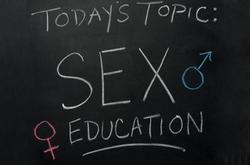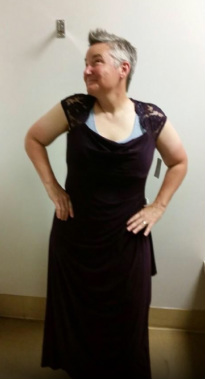 I don't remember much about my sex ed class. I attended a handful of different elementary and middle schools, and I remember: (1) the girls being separated from the boys; (2) being shown some kind of cartoon about sperm and eggs; (3) our PE teacher telling us we needed to use deodorant from now on. I also remember leaving the sex ed video being suddenly unsure about whether sex was what made babies. I had thought so going into it, but the movie hadn't said anything about sex, and the animated version of fertilization seemed pretty divorced from two people doing it. There was, of course, nothing at all about homosexuality, bisexuality, or gender identity or expression. The curriculum basically assumed that when girls grew up and got boobs, they would suddenly be interested in boys, dresses, and makeup. Growing up meant a continued separation of the sexes, and it meant that girls and boys couldn't really be friends after puberty. If you were a "tomboy," you'd grow out of it. Even if the curriculum had included something about homosexuality, the culture in the various working-class suburbs from which I hail would have never allowed it to be taken seriously. If anyone had "come out" in my high school or middle school, they'd have been ostracized and probably beaten to a pulp. I know that some schools still teach sex ed basically this way, and in other schools it's way more progressive. I was super heartened to stumble on a blog post written earlier this year that translates part of a pamphlet that Dutch girls are given. I was floored by how incredibly progressive and awesome and inclusive it was. Here's my favorite part: Take the time to figure it out! Are you uncertain whether you’re lesbian? That’s perfectly natural. Often, you’ll know after puberty what you are exactly. In any case, try to enjoy it if you fall in love, whether it’s with a girl or a boy. Wait, what? Seriously? No big deal either way? Love is love; just enjoy it? Can you imagine having been given something like this when you were a kid? Would it have mattered? And can any of my younger readers talk about what sex ed is like in the U.S. these days?
5 Comments
 In the queer community, we talk a lot about "gender dysphoria," often when talking about various trans identities. For example, a pre-op trans man might look at his breasts and think, "I'm a man! These don't belong on me!" But I've heard the word "dysphoria" used in many other ways, and I've gotten a ton of questions from readers about it: Can a butch feel dysphoria if she's forced to wear a dress? Can a heterosexual person feel dysphoria if she's dating someone of the same sex? Are trans people the only ones who experience dysphoria? Are they the only ones who experience "gender dysphoria?" The American Heritage dictionary on my shelf at work doesn't even include the word "dysphoria" [what???]. But the dictionary on my computer defines it as: a state of unease of generalized dissatisfaction with life. The opposite of euphoria. I think of "euphoria" as a state of extreme joy. So dysphoria is a state of extreme non-joy? I think the key is "unease." A dysphoric feeling is a feeling that something is not quite right--that it's not aligning how it's "supposed" to. Gender dysphoria is a more specific. WebMD says that it's a: condition in which a male or female feels a strong identification with the opposite sex. Not conforming to the social features related to one's biological gender is not in itself a disorder. Rather, a person with gender dysphoria experiences great discomfort regarding his or her actual anatomic gender. And while WebMD has its flaws, everything I searched in academic and professional medical journals says about the same thing. So under that definition, when my butch buddy C (pictured right) donned a gown for the Ada Initiative (the sports bra peeking out is a nice touch, don't you think?), she was experiencing some kind of, like, wardrobe dysphoria--as in, help! this doesn't belong in my closet!--but not actual gender dysphoria? That's how I understand it. Yet, there's something about her discomfort that is decidedly related to her gender. I mean, I'd experience some kind of fashion-related unease if I was forced to wear Crocs with a suit (or, TBH, Crocs with anything). But it's different kind of "this isn't right on me." And that something has to do with gender presentation. This makes sense if you don't think of gender as an either-or phenomenon. C associates her lovely purple dress (heehee... I chuckle every time I look at that picture) with femaleness, and identifies herself as female. But as a different kind of female. One who doesn't wear a dress. And while it's certainly not the same as the gender dysphoria a trans person experiences, it has at least a few elements of similarity, doesn't it? Does it make more sense to think of this as a kind of "gender dysphoria" if we think of "butch" as a gender? I feel like doing this still minimizes the distinct gender dysphoria felt by trans individuals, though. I don't know anything about dysphoria as a medical phenomenon, but I do know something about social psychology, and there's a related phenomenon in social psychology called "cognitive dissonance," which is the mental stress or discomfort experienced by a person who has two contradictory ideas/experiences happening at once. Like, suppose you think littering is morally irresponsible, yet when you ate lunch outside yesterday and your napkin blew away, you didn't go pick it up. This is so hard for the brain to deal with that we invent little ways to make things compatible (e.g., "it's just a napkin," or "there's trash pick-up around here every afternoon"). Is that just dissonance? Or is it also a kind of dysphoria? To me, it doesn't have the "unease" that I associate with dysphoria. I don't see gender as a "spectrum;" I see it as a field with lots of different spaces in it: overlapping, related to each other, messy, contradictory. Some people might be comfortable standing in only one place on the field. Others might be comfortable in a whole lot of places. If I only like to hang out in the "butch" spot, and I'm wearing a dress, which I see as non-butch, and I feel uncomfortable as a result of this misalignment, what is it, precisely, that I am feeling? I don't think it's gender dysphoria, exactly, but I think it's some very specific type of gender-related discomfort or dissonance. And for me, at least, it's a similar feeling as if someone calls me "sir." I think: nope, you didn't get me right. You're not seeing me as I want to be seen. I want to be seen as female, but as a certain kind of female. A non-"deviant," but specific genre of female--which, sure, incorporates a lot of elements society considers "masculine." I bet I have a lot of readers of all different identities who want to weigh in on this one. I'll be super interested to read your comments. To be butch is to be able to pass as lots of things, and at the same time to fail people's little "passing" tests constantly. It's a weird space to be in--a little vortex of contradictions. Here are all the things I, personally, often do not pass as (whether or not I want to).
Things I frequently can't pass as: 1. Female. "Can I help you, sir?" 2. Male. "Can I help you, ma'am?" 3. Cool. Every time I go to SF or NYC, I am reminded of how uncool and unhip I really am. I don't even have any tats or interesting piercings! 4. Boring. Because some people seem to think that all lesbians know where the cool clubs are... Little do they know that my idea of "partying" is to curl up on the couch, trying to prevent my DGF from trouncing me in Words With Friends. Sometimes I "party" HARD. 5. Under 35. I'm starting to get grey hair. 6. Over 35. Because surely someone with my education who is over age 35 would be more established in a career, right? 7. Butch. As in, "You're butchish, but you're not really butch." 8. Cisgender. Because some people who are trying really hard to be trans*-inclusive assume that all gender-nonconformists are on a trans* spectrum. 9. Working or lower-middle class. Even though it's the class background with which I identify, I traded in 90% of my street cred for fancy degrees. 10. Upper middle class. Certain mannerisms and ways of being are imprinted on you at an early age, and you'll never feel like you really belong in certain places... or at least, I won't. 11. Non-genderqueer. Seriously, I had someone say last year, "I identify you as genderqueer." I was like, "Um, congratulations, but you don't get to identify me!" 12. A responsible dog parent. Because my dog literally screams when we are walking away from another dog and she wants to stay to play/fight/sniff. Name me one thing you can't always pass as. I've been thinking a little about what it means to "feel butch"--not in general, but for moi. What is it about feeling butch, exactly, that's different from self-confidence, or different from just feeling "masculine?" I suspect that this varies a lot from person to person, but for me, at the core of it, there's some kind of inner strength that comes from being a little different, from being a strong, confident woman with masculine qualities--and even more importantly, who is okay with those qualities, okay with being different, and maybe even a little proud of who she is.
Certain songs give me this feeling. Not necessarily because of the lyrics or the singer or even because I think the song is particularly fabulous. But I thought I'd share some of those songs here, and what I'd really like is if, after reading these, you could share the names of one or two of your own songs that make you feel butch--whatever that means to you. Here are some of mine. I don't pretend to have sophisticated taste. :) I put links to these in case you don't know them and want to see if you like them.
So there you go. What are some of yours? And what other song lists would you like to see? Songs that make me cry? Best breakup songs? Best roadtrip songs with your girlfriend? Best pride songs? |
|

 RSS Feed
RSS Feed